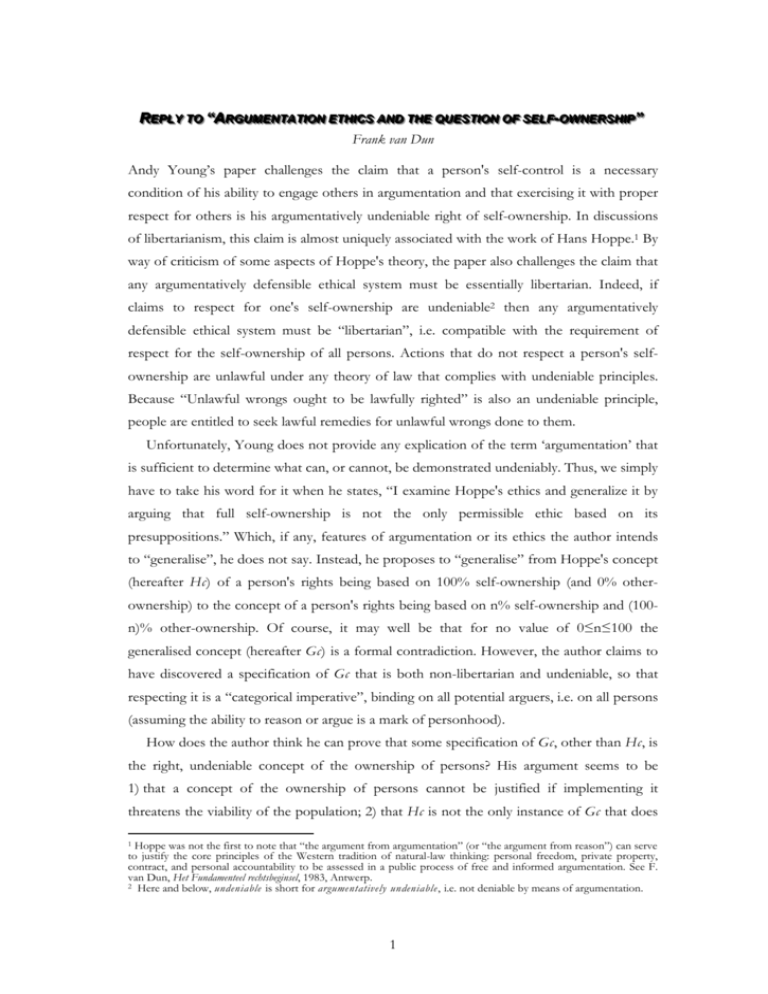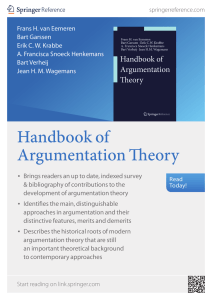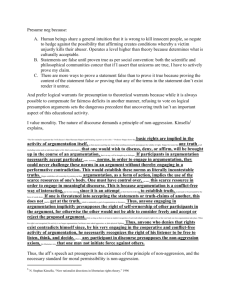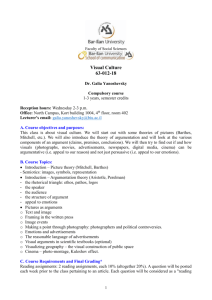The idea behind argumentation ethics is straightforward:
advertisement

R O G U M E N T A T O N E T H C S A N D T H E Q U E S T O N O F S E L F O W N E R S H P REEEPPPLLLYYY TTTO O ““A ARRRG GU UM ME EN NT TA AT TIIIO ON NE ET TH HIIIC CS SA AN ND DT TH HE EQ QU UE ES ST TIIIO ON NO OF FS SE EL LF F--O OW WN NE ER RS SH HIIIP P”” Frank van Dun Andy Young’s paper challenges the claim that a person's self-control is a necessary condition of his ability to engage others in argumentation and that exercising it with proper respect for others is his argumentatively undeniable right of self-ownership. In discussions of libertarianism, this claim is almost uniquely associated with the work of Hans Hoppe.1 By way of criticism of some aspects of Hoppe's theory, the paper also challenges the claim that any argumentatively defensible ethical system must be essentially libertarian. Indeed, if claims to respect for one's self-ownership are undeniable2 then any argumentatively defensible ethical system must be “libertarian”, i.e. compatible with the requirement of respect for the self-ownership of all persons. Actions that do not respect a person's selfownership are unlawful under any theory of law that complies with undeniable principles. Because “Unlawful wrongs ought to be lawfully righted” is also an undeniable principle, people are entitled to seek lawful remedies for unlawful wrongs done to them. Unfortunately, Young does not provide any explication of the term ‘argumentation’ that is sufficient to determine what can, or cannot, be demonstrated undeniably. Thus, we simply have to take his word for it when he states, “I examine Hoppe's ethics and generalize it by arguing that full self-ownership is not the only permissible ethic based on its presuppositions.” Which, if any, features of argumentation or its ethics the author intends to “generalise”, he does not say. Instead, he proposes to “generalise” from Hoppe's concept (hereafter Hc) of a person's rights being based on 100% self-ownership (and 0% otherownership) to the concept of a person's rights being based on n% self-ownership and (100n)% other-ownership. Of course, it may well be that for no value of 0≤n≤100 the generalised concept (hereafter Gc) is a formal contradiction. However, the author claims to have discovered a specification of Gc that is both non-libertarian and undeniable, so that respecting it is a “categorical imperative”, binding on all potential arguers, i.e. on all persons (assuming the ability to reason or argue is a mark of personhood). How does the author think he can prove that some specification of Gc, other than Hc, is the right, undeniable concept of the ownership of persons? His argument seems to be 1) that a concept of the ownership of persons cannot be justified if implementing it threatens the viability of the population; 2) that Hc is not the only instance of Gc that does Hoppe was not the first to note that “the argument from argumentation” (or “the argument from reason”) can serve to justify the core principles of the Western tradition of natural-law thinking: personal freedom, private property, contract, and personal accountability to be assessed in a public process of free and informed argumentation. See F. van Dun, Het Fundamenteel rechtsbeginsel, 1983, Antwerp. 2 Here and below, undeniable is short for argumentatively undeniable, i.e. not deniable by means of argumentation. 1 1 not threaten the survival of the population; and 3) that Hc is “too strong”, because it rests on Hoppe's confusion of “argumentation with winning an argument.” I shall return to (1) and (2) later. As to (3), it appears to be an indication of the author's misunderstanding of the relevant concept of argumentation and the ethics implied in it. The point to stress here is that although ‘argumentation’ means interactive argumentation and discussion involving at least two separate individual persons who are not in full agreement on everything with one another, not every exchange of speech acts between two or more dissenting individuals constitutes argumentation — for example, idle conversation, gossip, negotiating contracts, a teacher instructing his pupils, an extortionist threatening his victim. Certainly, a ventriloquist having a mock conversation with his dummy, or a staged discussion involving, say, two or more actors reproducing lines written by the same playwright, is not an example of argumentation. Specifically, argumentation is not the same as debate. The purpose of argumentation is to arrive at a conclusion that ought to be accepted by all persons. The purpose of a debate is to pit two or more debaters against each other in order to find out which one is better at winning over the audience (which may be a single judge, a jury, or a group of people with an interest either in the subject under debate or in the debaters). The audience decides who “wins the debate”, but it does not have to justify its decision. Consequently, the winning party may not have the best arguments. It may win because it “plays the audience” better than the opposing party. Indeed, a debate is a largely staged confrontation, a “game”. The rules of a debate usually mimic the rules of argumentation to some extent, and sometimes they ought to do so as much as is practically possible, e.g. in debates in courts of law, where the judge's decision is supposed to do justice to the parties arguing their case before him. The author's misunderstanding of the nature of argumentation is reminiscent of an argument that keeps cropping up in appraisals of Hoppe's thesis that only self-owners can participate in argumentation. It is often claimed that Hoppe must be wrong because a slave can argue and can be permitted to argue, although in a slave-holding society a slave is not considered a self-owner. Indeed, it cannot be denied that, for example, a Roman master could have bought a Greek slave for the specific purpose of providing some intellectual entertainment for himself and his guests. However, if the entertainment consists of a discussion of the justifiability of slavery, how likely is it that the master will conclude the evening with the manumission of all his slaves, rather than with a triumphant exclamation to his guests: “Didn't I tell you what a clever chap he is! Come back next week when we'll have him do a number on whether the gods have a law to live by”? Who would argue that 2 the Roman master complies with the ethics of argumentation? Who would claim that taking argumentation seriously is the same as pretending to take it seriously? Because of the prevalence of such misconceptions, it seems appropriate to start off with a closer look at argumentation, properly understood, in order 1) to distinguish it from other exchanges of speech acts that in some respects resemble it, and 2) to assess the claim that argumentation implies an “ethic” of undeniable norms or categorical imperatives. .. Although some disagreement is a necessary condition of argumentation, all the participants or parties must follow certain rules R*, if argumentation is to be possible: * Each party should recognise the others as free and equal relative to himself: he should speak for himself and not for any other party; he should not presume the authority to prescribe what another party may claim or question. * Every claim may be challenged, unless it has already been shown to be undeniable. * Each party should accept propositions found to be undeniable seriously, as personal commitments. * Each party should make clear whether he is making, questioning or challenging a claim. * In making or challenging a claim, each party should appeal to the others' common sense or conscience (not popular opinions or other people's idiosyncrasies) while committing oneself to recognise the propriety of similar appeals made by them. * The party who asserts a claim should accept to respond to questions about it and to bear the burden of proof, if its veracity, validity or relevance is challenged. * A question must be answered satisfactorily or else made out to be irrelevant to the discussion. * A question is answered satisfactorily, (a) if no other party to the discussion challenges the answer; (b) if each challenge of the proposed answer is met with a satisfactory answer or is withdrawn later in the discussion. * A participant should admit the inadequacy or wrongheadedness of his argumentative strategy, (a) if he contradicts his own assertions; (b) if he objects to his opponents' use of evidence, arguments or argumentative strategies which he himself uses at some stage in the discussion; (c) if he uses as a meaningful and relevant argument something he explicitly or by implication holds to be meaningless or irrelevant to the discussion; 3 (d) if he cannot produce new evidence or arguments but instead insists on repeating earlier discussion moves that have already been shown unsatisfactory or irrelevant; (e) if he starts abusing any other party, orally or physically, or is caught lying or bluffing about the evidence or proofs he claims to have. These rules are not arbitrary or merely conventional. They are necessary, if argumentation is to achieve its proper end. Thus, participants in an argumentation ought to know about the purpose of arguing and recognise the primacy of argumentation relative to other methods for resolving disputes: A1) The purpose of argumentation is to discover the right answer to a question or at least the best answer the participants can produce, given their abilities and the evidence to which they have access — i.e. an answer that no participant is willing to deny, and preferably, an answer that no participant can deny in good conscience. In short, arguers ought to be conscientious truth seekers. A2) The proper way to resolve a dispute about the truth of a proposition is by argumentation between its proponents and its opponents. In particular, disputes about how to resolve disputes ought to be resolved by argumentation. That we ought to resolve disputes about truth claims by argumentation is undeniable: to question the validity of that ought-statement is to ask for reasons for accepting it that can be defended in an argumentation. For other types of disputes, reason may prescribe other methods, e.g. negotiation, separation, even drawing lots. However, it is in any case undeniable that we ought to abstain from using invasive methods such as violence or fraud for resolving disputes with others who do not use them against us: we cannot seriously argue that physically forcing or deceiving another person into accepting our arguments serves the purpose of discovering whether the arguments are right or wrong. A1 and A2 are the basic principles of the ethics of argumentation. They are undeniable or categorical imperatives. The rules of argumentation (R*) are also undeniable. For example, nobody can coherently argue that contradicting oneself, denying the obvious or refusing to answer a relevant question serves the purpose of argumentation. Those who deny that the proper purpose of argumentation is as stated above cannot cogently argue that their position is the right or the best attainable answer to a question about the purpose of engaging others in an argument. 4 .. Most argumentations are undoubtedly inconclusive, but occasionally some yield a conclusive outcome. Of particular interest are “dialectical truths” and “dialectical falsehoods”, i.e. propositions that cannot be challenged, respectively defended, successfully in any argumentation.3 Logical and mathematical truths are examples of dialectical truths, formal contradictions examples of dialectical falsehoods. While “I do not exist” and “You do not exist” are not formal contradictions, they are dialectical falsehoods: no arguer can defend them and yet maintain that he is arguing with the other. “No man is immortal” is undeniable, because no counterexample can be conclusive: the fact that a person is not dead yet is not proof of his immortality, no matter how old he happens to be. “All men are mortal” (formally equivalent to “No man is immortal”) is therefore also undeniable. However, an empiricist might want to interpret that proposition as the equivalent of “For every man x, some human person at one time or another has evidence of x's death”. But interpreted in that way, the proposition is not undeniable: no human person will ever have conclusive evidence of the last human being's death. That does not make the last human being immortal, but it shows that “All men are mortal” can be dialectically true (undeniable), even though there is at least one conceivable case in which its empiricist interpretation must be false. It is undeniable that there are uniquely human excellences, i.e. qualities which it is better for a person to possess than to lack, and better to possess to a higher degree than to possess to a lower degree: intelligence, will, conscience, mindfulness, truthfulness, trustworthiness, justice. Few people will deny this categorically in an argument (as against denying it “only for the sake of the argument”), and those who do categorically deny it cannot consistently appeal to their opponents' intelligence, will, conscience, etc. in an argumentative effort to convince them that it is right to deny it. That there is no rationally defensible ethics apart from the ethics of argumentation is a dialectical truth. Only fools deny that it is better that bridges do not to collapse than that they do collapse, or that it is better that medicine heals a patient that that it kills him. Assuredly, a person might want a particular bridge to collapse, or a medicinal drug to kill a particular individual. However, even such a person will find that the propositions “Bridges ought not to collapse” and “Medicine ought to heal” are undeniable by anyone who understands the proper purpose of bridges, medicine and argumentation. Similarly, “Statements ought to be true” is an undeniable proposition, despite the fact that most people on many occasions Some people claim that dialectical truths are undeniable only by arguers when they are arguing. In a sense, that is true. Still, a proposition that could not be denied successfully at any time when an arguer would call it into question is undeniable for all persons at all times. 3 5 prefer to tell a lie rather than the truth. Only fools deny that many human things have a proper purpose. Argumentation presupposes that the arguers have a lot in common, i.e. share or participate in the same things, though not necessarily to the same degree or with the same enthusiasm. Although each of us has a stomach and a brain, we do not share or participate in the same stomach or brain. That is no impediment to our having rational discussions. However, if each of us were to have his own separate standards of excellence with respect to matters of observation, thinking, understanding, judging, making and acting in the same way in which each of us has his own separate heart or lungs then we would not be able to engage one another in the uniquely human activity that is argumentation. .. The case for self-ownership is straightforward and undeniable. Each of us has direct control over parts of his body, and no one has direct control over any part of another's body. Some bodily movements merely happen to a person, other such movements happen because he makes them happen; but there are also movements that he simply and wilfully performs without first having to do something else. Similarly, each of us has direct control over parts of his mind, and no one has direct control over any part of another's mind. Some thoughts (dreams, hallucinations, “passing thoughts”) merely happen to a person even when he is not thinking, but other thoughts require him to think, which he can do simply and wilfully without first having to do something else. A person's powers of self-control wax and wane in the process of growing up and then growing old, but most people can and do extend and refine some of them considerably by training and exercise. Importantly, although it may be possible for a person to override another's powers of self-control, he cannot make another do or think something simply by willing him to do it. He needs to apply physical force in the form of drugs, mechanical or electromagnetic equipment, or other, less scientifically sophisticated means of torture to weaken or disable the other's powers of self-control. In the context of argumentation, self-control is an undeniable fact, at least as far as the arguers are concerned. No person can argue that, while making that argument, he is not in control of himself. Moreover, “No person capable of participating in argumentation is devoid of self-control” is a dialectical truth. Keeping the distinction between participating in argumentation and pretending to do so in mind, we cannot conceive of a case of argumentation in which an arguer lacks the self-controlling capabilities that distinguish a natural person from a non-person (or an artificial person, e.g. a corporation). 6 The move from the fact of self-control to the right of self-ownership requires further argumentation but is not problematic. The proposition “Persons ought to respect each other as free and equal persons relative to one another” is also a dialectical truth, undeniable by anyone acquainted with persons and the purpose and method of argumentation. It is a categorical, not a hypothetical imperative (e.g. “Persons who happen to want to settle their differences with others by argumentation ought to respect them as free and equal”): it is also categorically imperative that persons ought to settle their differences by argumentation (or argumentatively defensible methods), whether or not they want to do so. Still, the fact of self-control is not a sufficient ground for claiming the right of selfownership. Talk of categorical imperatives or undeniable truths would be pointless, if no person were physically able to disregard, deny or repudiate them. .. Obviously, self-ownership (in Hoppe's sense) is not to be construed as an absolute but only as a presumptive right. An aggressor cannot claim that defensive or retaliatory uses of violence against his person or property are unethical (unlawful, illegitimate) on the ground that they violate his self-ownership, for by his aggression he surrenders his self-ownership at least for as long as he does not “undo” his aggression (say, by providing adequate compensation to his victim). The ethics of argumentation implies that it is categorically wrong to use or threaten violence against a self-owner. This libertarian “non-aggression principle” is but one implication of the categorical imperative that the proper ways to resolve disputes ought to be determined by argumentation among the disputing parties. Other implications of the ethics of argumentation are that every person must be presumed innocent of aggression or fraud until proven guilty and that only people who are innocent of those sins can claim the protection of law. Thus, all people are to be considered selfowners “by default”, until they are proven guilty of aggression (in which case they are no longer to be regarded self-owners, but persons owned wholly or in part by those against whom they have aggressed.) Against Hoppe, Andy Young claims that other than libertarian ethical positions can be argumentatively justified, if adherence to them does not entail the extinction of the human race or its reduction to an animal-like existence. We note that neither the libertarian nonaggression principle nor the ethics of argumentation precludes any set of rational persons from committing themselves, by expressing their free and informed consent, to live and work together according to the requirements of a particular property or ownership scheme that deviates from libertarian self-ownership (and its implications with respect to just 7 acquisition by first users: finders keepers, homesteading and the like). Full-fledged communism may be a foolish idea, but self-owners have a right to enter into an agreement with consenting others to try it out. .. If Andy Young were merely proposing a scheme for the establishment of a new voluntary society or community, a libertarian would shrug his shoulders and say, “Go ahead, try it — but don't pretend that your agreement with consenting others gives you the right to impose your scheme on non-consenting others.” However, the author's claim is not as modest as that. He claims to have discovered a non-libertarian scheme of ownership that can be justified categorically — not only contingently within a particular group of like-minded people sympathetic to the same idea, but argumentatively against the objections of every person. Let us consider his scheme — he calls it a scenario — which he labels ‘D’: (D) Each man will be partially and equally owned by everyone else, while maintaining a controlling share of self-ownership. Young clarifies his meaning of the term ‘controlling share of self-ownership’ as follows: A man's own will to act “overrides any other individual's share [of ownership in himself] taken alone” but “could be overridden by a coalition of two or more equal other-owners of non-controlling shares.” Specifically, a controlling share is not the only share: if it were then D would be equivalent to Hoppe's 100% self-ownership. It is also not a majority of shares, which would mean that a man owns more than 50% of the shares in his person and so is able to override any coalition of other shareholders. D is obviously a specification of Gc (see above) defined by three additional conditions: 1) a person's percentage share σ in his self must satisfy σ<50 and σ>100/P, where P is the total number of persons in the population; 2) every other person owns (100-σ)/(P-1) percent of that person; and 3) σ<n*(100-σ)/(P-1). If the “two or more override one” condition is taken seriously then n=2. Consequently, if P=4 then σ must be larger than 25 and smaller than 40 percent [2/3 of (100-σ)]. If P=1000 then σ must be larger than .1 and smaller than .1998 percent [2/999 of (100-σ)]. Apparently, however, we should not take n=2 seriously. In the final section of the paper, the author asks whether 26 individuals out of 101 can “ethically aggress” [sic] against a single person, and answers in the affirmative. Why n=26? Because he began with the arbitrary assumption that a controlling share equals 20% — and if P=101 then 26 is the 8 smallest number of opponents whose combined shares in the individual outweigh his one controlling share! Recalculating the example with n=2, we find that a controlling share cannot be more than 1.9605%. Fine, but how and where do the D-people find the numbers on which their lives depend? The author tells us, rightly, “D does not necessarily imply a libertarian ethic.” He also tells us that compliance with D is a categorical imperative on the grounds that it “(i) passes a universalization test, and (ii) permits action and the survival of mankind.” Surely, there are lots of rules that satisfy those conditions but are nevertheless not undeniable. What guarantee is there that any two such rules are mutually compatible? If two of those rules are mutually incompatible then we are left with conflicting categorical imperatives — i.e., with no categorical imperatives at all. Until the author shows that a proposition passing his tests is for that reason alone undeniable, it remains a mystery why anyone should consider D a categorical imperative. Any number of people may agree to arrange their affairs according to D, but their agreement does not turn their “social contract” into a categorical imperative. Moreover, it is doubtful that the author's scenario does not rule out action. For small populations, D may work. However, as the size of the population increases, the number of potential coalitions increases exponentially. If n=2 is maintained then the concept of a controlling share rapidly loses significance and D ends up being virtually indistinguishable from arrangements that the author explicitly characterises as precluding action: Each person owns an equal share in every person; each person owns an equal share in all other persons but no share in himself. If, however, the size of the “controlling share” is fixed then the minimum size of an opposing coalition (and therefore the cost of organising it) increases as the population grows larger. At some point, there is no longer a practically significant difference between D and full self-ownership. It is not clear whether D comes with a presumption in favour of majority tyranny (“An individual person should prove that there is no coalition against his undertaking a particular action that is larger than any coalition willing to let him do so”) or a presumption in favour of individual liberty (“An opponent of an action should prove that those against it outnumber those in favour”). Nor is it clear whether those who express no opinion on the permissibility of an action should be presumed to side with its opponents or not. We are not told how and where either party should present its claim to have the majority of shares in an individual. Nor are we told about the responsibility of the members of either party: are they legally accountable for the consequences of an individual's actions that they permitted, or for the consequences of his abstaining from action in compliance with the demands of a majority? What happens to a man when he acts before a vote is taken? According to Young, 9 an individual “always has first-mover status”, as “a contrary coalition is costly in terms of time, effort and information gathering.” However, D does not guarantee immunity for opportunistically exploiting the costliness of forming a coalition by quick unanticipated action. Nor should it do so: an aggressor has first-mover status, because he can choose his targets as well as the time and place of his attacks and organising a defensive coalition is a costly affair. In any case, under D, all practical questions concerning an individual's life and work are to be resolved ideally and ultimately by counting heads, not by argumentation. Needless to say, counting heads is not the proper way to identify categorical imperatives or to resolve disputed questions generally — including questions about the proper way to resolve a particular dispute. “A majority has the right (ought to be permitted) to use coercive violence against a minority” is not an undeniable normative truth. Young gives his game away when he warns us that we should not lose sight of “the analogy [of D] to ownership in a corporation”. Supposedly, that analogy “effectively indicates that exclusive control is not presumed in justifying actions and statements rationally.” This is wrong: By making an argument in a general assembly of a corporation, a person does demonstrate exclusive self-control, even if he does not thereby demonstrate exclusive ownership of himself. Young asks us to suppose that a shareholder owning only one out of a total of S shares makes a proposal in the general assembly. Then he tells us that this supposition “does not in any way belie the fact that [the proposal] is indeed an argument”, even though its “weight” is only 1/S. From the point of view of the ethics of argumentation, this is irrelevant. In the general assembly only the votes count to weigh the proposal, but in an argumentation its weight depends on whether it can be defended satisfactorily against counterarguments, and ultimately, on whether it ought to be accepted by all rational persons. So, what is the point of the corporate analogy? It is to be found in the fact that D implies that every person be considered on the analogy of a corporation (pi) the shares of which are held by every person. The analogy suggests that all natural persons are shareholders and therefore members of the general assembly of every pi. Now, seriously, how many general assemblies can a natural person attend in his lifetime? Arguably, apart from the controlling shareholder and a few of his friends and personal enemies, the most likely attendees in any assembly will be chronic meddlers, who [under D] are also likely to be the majority of those present to vote. If so, would those meddlers not find it efficient to merge all those pi into a single corporation W (“The World, Inc.”), even if it meant that every pi (and therefore, every person) is fully and legally owned by W, under the statutes and regulation of W drawn 10 up and approved by those very same inveterate meddlers? Moreover, since Young assumes that D is a categorical imperative, any statute drawn up in conformity with D would be “ethical”, no matter how arbitrary or coercive it may be: “[coalition-based coercion] opens the door for the possibility of ethical government.” The fact is that a shareholder who makes an argument in the general assembly of a corporation C still demonstrates self-control as a natural person but obviously not selfownership as a shareholder of C. Indeed, he would be permitted to speak in the assembly only as a shareholder of C. If we took the author's analogy seriously and conceded that the shareholders of C are themselves corporations, i.e. artificial or fictitious persons, then we should also admit that natural persons attend the meeting not “in person” (as themselves) but only as “representatives” of some other conventional corporate construction. At this point, the connection — if there ever was one — between, on the one hand, the ethics of argumentation, and on the other hand, the author's generalised concept of selfownership Gc and his scenario D is irretrievably lost. The ethics of argumentation applies only to natural persons: they are the only sort of persons who can engage one another in argumentation. It does not apply to artificial persons, because these have to be “represented” by natural persons. What those natural persons, when acting as representatives of an artificial body, are entitled to say or question depends entirely on the statutory and regulatory conventions defining that body. It does not depend on the purpose and methods of argumentation, which are defined by categorical imperatives. Also, a natural person participating in argumentation need not be “represented”. He is a natural being capable of self-presentation, not defined by any statutory or regulatory convention. .. To sum up: “Argumentation ethics and the question of self-ownership” fails to make a dent in case for full self-ownership and libertarian ethics. It also fails to show acceptance of D to be categorically imperative. The primary reason is that its author lacks sufficient understanding of the purpose and method of the uniquely human practice of argumentation. 11






